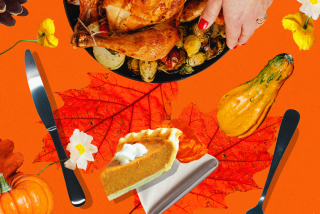Rituals and the healthy family
- Share via
Brother-in-law and family are stuffed into the guest room, the flu is marching like the plague through the household and there’s still a dozen gifts to buy. As if anyone needs reminding: Holiday stress is upon us.
Yet so is holiday cheer, and as a new report finds, many family rituals and routines -- from hectic holiday feasts to decorating the Christmas tree or sending out cards -- provide stability and emotional support, especially for children. The conclusions are based on a review of 50 years of research on the effect of family dynamics on mental and physical health.
“Family rituals can be so subtle we don’t even notice them,” said Barbara Fiese, a psychologist at Syracuse University in New York and lead author of a report in the current issue of the Journal of Family Psychology. “Simply the act of walking in the door after a day at work, the way you greet people, the way kids or a spouse or the dog comes up to meet you -- these can become an important ritual in a family’s daily life.”
Fiese and her colleagues analyzed 32 studies, including in-depth investigations of families with young children, with adolescents and with a single parent. In one series of studies, psychologists followed families with at least one alcoholic parent.
If these households had meals together, bedtime rituals and other routines, children were less likely to develop drinking problems than those living in chaotic, unstructured families.
Children in families that sat down to dinner together three or four times a week and who had weekend and holiday rituals tended to do well in school and reported lower levels of anxiety than those in families without such rituals.
The Syracuse University review also noted that often the first sign that a family is breaking apart is the disruption of rituals, whether it’s the Saturday morning trip to the doughnut shop or the Sunday walk to church.
If husband and wife do split, their children may be in even greater need of these familiar touchstones. “They may work to protect the children from some of the stresses associated with divorce,” Fiese said.
There are exceptions. When the entire burden of preparing a holiday celebration falls on a single person -- say, the mother -- there may not be much reward for her. All the more reason, Fiese said, to recruit help and make the preparation itself a ritual.
“Either get help or cut back,” she said. “One thing I suggest families do is to sit down and ask how important to them the ritual is. If it’s important, you ought to be able to get some help.”






